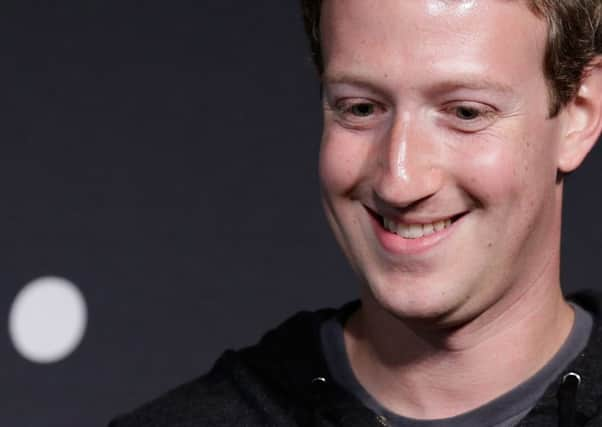Facebook’s Zuckerberg donates £15m to Ebola fight


In a post on his social media site, Mr Zuckerberg said they would give the money to the US-based Centres for Disease Control Foundation.
“We need to get Ebola under control in the near term so that it doesn’t spread further and become a long-term global health crisis that we end up fighting for decades at large scale, like HIV or polio,” Mr Zuckerberg wrote.
Advertisement
Hide AdAdvertisement
Hide AdThe donation came as the death toll in the outbreak reached 4,447 from a total of 8,914 cases, according to World Health Organisation figures.
Yesterday was the first day of screening to counter the threat from Ebola at the UK’s biggest airport. The first passengers arriving at Heathrow after taking flights from West Africa were questioned to establish if there had been any potential exposure to the disease, and had their temperatures taken. The system is expected to be extended to Gatwick and St Pancras Euro- star station over the next week.
But Public Health England (PHE) and Border Force officials admitted there is no fixed plan to deal with people who decline to co-operate.
One of the first to go through the checks, documentary maker Sorious Samura, 51, also reportedly branded the screening process a “joke” after passport control staff only realised he had come from Liberia via Brussels when he volunteered the information.
Dr Paul Cosford, PHE director, said passengers who boarded an indirect flight to the UK from Liberia, Guinea or Sierra Leone would be automatically flagged at passport control. But he declined to say if screening would be “mandatory” for the few hundred expected each month. “Our expectation is that everybody will come through [screening],” he said.
“We will be learning from the experience over coming days as to how it is working. The principle benefit is about distributing information to people about how to contact, symptoms to look for, and who to contact in the event they do get symptoms when they are in this country.
“Is it mandatory? We expect people to come through and we cannot see why they wouldn’t. It depends what you mean by mandatory. My understanding is that they have to do it.”
Dan O’Mahoney, chief of staff at the Border Force, said there was no “script” for dealing with passengers who did not want to comply but he was not “anticipating that it will be a problem”.
Advertisement
Hide AdAdvertisement
Hide Ad“We envisage that most people will be fine with the request to undertake that screening,” Mr O’Mahoney said. “If it becomes an issue and we find a number of people are saying they don’t want to undergo screening, we will need to look at the words we use and how we are actually referring them on to PHE.”
The checks are expected to cost £9m over the next six months. Border Force officials will pass people travelling from affected countries to teams of PHE medics based at the airport.
An “Ebola health assessment questionnaire” asks if individuals have been in contact with suspected victims of the disease, visited “traditional healers”, or been admitted to hospital. They are also quizzed on whether they are experiencing headaches, vomiting, diarrhoea or unexplained bleeding.
Once their temperature is taken, they will be free to go, referred for further assessment, classed as low risk and sent away with information to monitor their condition, or classed as higher risk and actively monitored. Plans are in place to expand the system to other points of entry if necessary – although the vast majority of travellers from West Africa arrive at Heathrow.
Last night, WHO assistant director general Bruce Aylward told a press conference in Geneva that the total number of Ebola cases was expected to top 9,000 by the end of this week.
But he said there were some positive indications the rate of spread of the disease may be slowing in some of the areas first affected, with some 95 per cent of the cases occurring in the same limited number of districts of Liberia, Sierra Leone and Guinea hit a month ago.